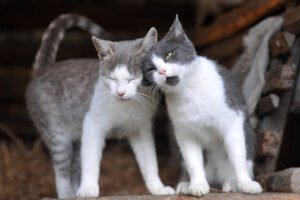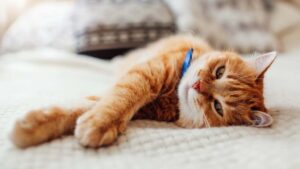How to Stop a Cat from Licking its Fur off? – Dangers You Should Know!

Cats are known for their grooming habits, but excessive licking can lead to fur loss and skin irritation. If you’ve noticed your cat is constantly licking and pulling out its fur, it’s important to address the issue. In this article, we’ll discuss how to stop a cat from licking its fur off. From identifying potential causes to implementing effective solutions, we’ll provide you with the information you need to help your cat stop this behavior and maintain a healthy coat.
Why is your Cat licking its Fur off?
Cats are naturally fastidious animals, and grooming is an essential part of their daily routine. However, sometimes cats can take grooming to the extreme, and start to overgroom, leading to hair loss and skin irritation. There are several potential causes of overgrooming in cats, including medical issues, behavioral problems, and wounds.
Allergies:
Allergies are a common cause of overgrooming in cats. Cats can be allergic to a variety of things, including food, pollen, and flea bites. When a cat is allergic to something, it can cause intense itching, leading to excessive grooming and hair loss.
Parasites:
Parasites like fleas and mites can also cause overgrooming in cats. When a cat has fleas or mites, it can cause intense itching, leading to overgrooming and hair loss. It’s essential to keep your cat protected from parasites by regularly using flea and tick preventatives.
Skin Infections:
Skin infections can also cause overgrooming in cats. If your cat has a bacterial or fungal infection, it can cause intense itching, leading to overgrooming and hair loss. Ringworm is a common fungal infection that can occur in cats, causing the cat to cat to lick the effected are for relief.
Pain:
If your cat is in pain, it may overgroom as a way to cope. Cats may also lick or bite at an area that’s painful, leading to hair loss and skin irritation. Arthritis, dental issues, and injuries are common causes of pain in cats.
Anxiety:
Anxiety and stress can also cause overgrooming in cats. If your cat is anxious or stressed, it may turn to overgrooming as a way to cope. Changes in the environment, new pets, or a lack of attention can trigger anxiety in cats.
Boredom:
Some cats may overgroom out of boredom. Cats are curious and active creatures, and they need adequate stimulation and enrichment to keep them mentally and physically healthy. If they don’t have enough toys to play with or other forms of enrichment, they may become bored and resort to overgrooming as a way to pass the time. This is especially true for indoor cats who do not have access to the outdoors, as they may not have enough opportunities to explore and play.
Compulsive Behavior:
Some cats may overgroom due to compulsive behavior, which is a rare condition. This behavior is believed to be linked to a genetic predisposition, and some breeds are more prone to this behavior than others. Cats with compulsive behavior will groom obsessively, even to the point of self-injury. There also psychological conditions such as OCD (Obsessive Compulsive Disorder) and Psychogenic Alopecia which can cause cats to lick their fur excessively.
It’s essential to identify the underlying cause of your cat’s overgrooming before trying to address the issue. Once you’ve identified the cause, you can work with your veterinarian to develop a treatment plan that will help your cat stop licking its fur off, and regain a healthy coat.
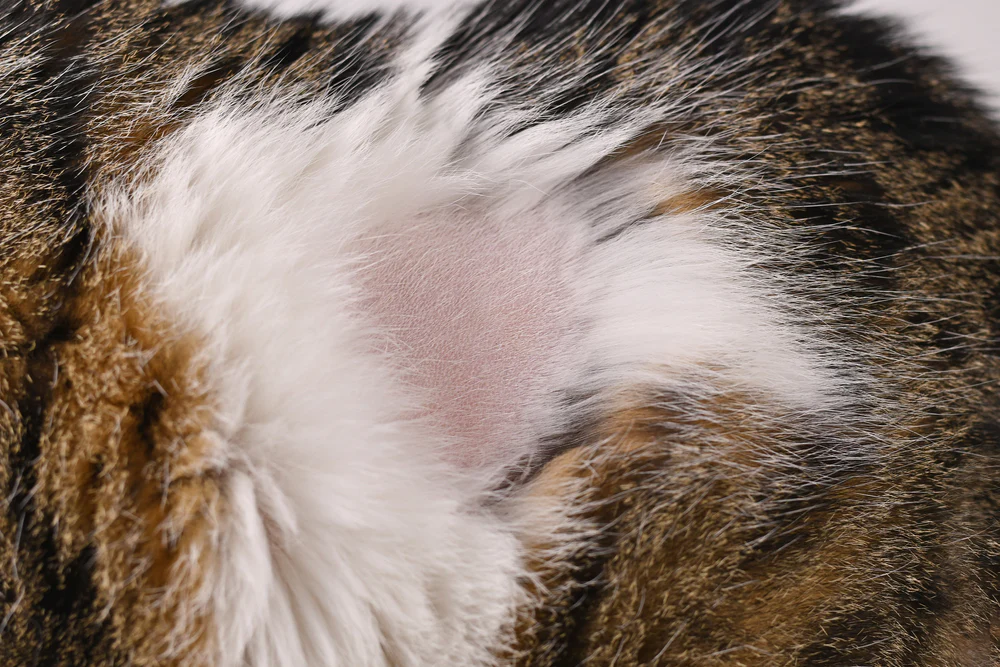
Identifying Overgrooming in Your Cat
It is important to be able to identify overgrooming in cats as it can be a sign of underlying medical or behavioral issues. Identifying overgrooming early can allow for prompt treatment and prevent the issue from worsening.
Bald Spots and Hair Loss:
One of the most obvious signs of overgrooming is bald spots and hair loss. Keep an eye out for patches of thinning hair or bald spots on your cat’s body, particularly on their belly, legs, or tail. If you notice any hair loss, it’s essential to determine the underlying cause, as it can be indicative of a more serious health issue.
Redness, Swelling, and Irritation:
Overgrooming can cause irritation and inflammation of the skin. Look for any redness, swelling, or irritation on your cat’s skin, particularly in areas where they tend to overgroom. These signs can be particularly noticeable on the cat’s face, paws, or stomach.
Open Sores or Scabs:
If your cat is excessively licking or biting at an area, it can lead to the development of open sores or scabs. These sores can be painful and may become infected if left untreated. Look for any signs of scabbing or open sores on your cat’s skin, particularly in areas where they tend to overgroom.
Uneven Coat:
Cats with overgrooming issues may also have an uneven coat. This is particularly noticeable in long-haired cats, where you may notice patches of shorter hair or uneven growth. An uneven coat can be a sign that your cat is overgrooming, as they are focusing their attention on certain areas more than others.
Swallowed Hairballs:
If your cat is overgrooming excessively, they may be swallowing large amounts of hair. This can lead to the development of hairballs, which can cause digestive issues and discomfort. Keep an eye out for any signs of hairballs, including vomiting, retching, and loss of appetite.
Identifying overgrooming in your cat can be challenging, as cats naturally groom themselves frequently. Cats normally spend around 2 – 4 hours of their day grooming themselves. Anything more or less than that is generally considered abnormal, and may require your intervention.
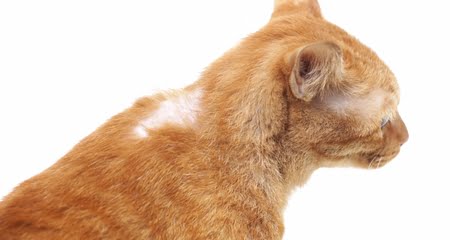
How to Stop your Cat from Licking Its Fur Off
Treating Medical Issues:
If your cat is overgrooming due to a skin condition such as flea allergies, skin infections, or ringworm, it is important to seek veterinary treatment. The treatment plan will depend on the specific condition your cat is experiencing, but it may include antibiotics, antifungal medication, or topical creams.
If your cat is experiencing a bacterial infection, your vet may recommend a medicated shampoo to help cleanse and soothe the skin.
Additionally, if your cat is experiencing excessive itching, your vet may prescribe antihistamines or steroids to help control the itching and reduce the urge to groom. In some cases, your vet may also recommend allergy testing or hypoallergenic diets to help identify and manage any underlying allergies that may be causing the overgrooming.
Regular Vet checkups:
Regular checkups with your veterinarian can help catch any medical issues early, which can prevent them from turning into more serious problems. It is recommended that cats see a vet at least once a year for a checkup, and more frequently for senior cats or those with pre-existing medical conditions.
During these checkups, your vet can examine your cat’s skin and coat, as well as discuss any changes in behavior that may be concerning.
Strategies for Reducing stress and anxiety in Cats:
If your cat is overgrooming due to stress or anxiety, there are several strategies you can try to help them relax. One of the most effective ways to reduce stress in cats is to provide them with plenty of hiding spots and vertical spaces to climb. This can help them feel safe and secure in their environment. You can also try playing with your cat regularly to help them burn off excess energy and reduce stress.
Additionally, special pheromone sprays and diffusers, such as Feliway diffusers, can help calm anxious cats. This is achieved by mimicking the natural pheromones that cats produce to communicate with one another.
Environmental enrichment:
Providing your cat with plenty of environmental enrichment can help reduce boredom and prevent overgrooming. This can include providing them with plenty of toys to play with, such as puzzle feeders and interactive toys. You can also try hiding treats around your home for your cat to find, or providing them with a window perch so they can watch birds and other wildlife outside.
Additionally, providing your cat with a variety of scratching posts and pads can help redirect their grooming behavior to appropriate areas. This will also tire them out faster, and rest more. This results in less time for your cat to be spending licking its precious fur off.
Maintain a Balanced Diet:
Feeding your cat a balanced and nutritious diet can help prevent overgrooming by keeping their skin and coat healthy. Make sure to provide your cat with high-quality cat food that is rich in essential nutrients, such as protein, vitamins, and minerals. Additionally, if your cat is experiencing skin issues, your vet may recommend a special hypoallergenic diet to help manage any underlying allergies.
A good diet also speeds up the recovering of lost hair, so that’s another reason why you should focusing on giving your cat a balanced and healthy diet.
Using Special Collars:
Soft E-collars, also known as inflatable collars, can be used to prevent cats from reaching areas they are overgrooming. These collars are designed to be more comfortable for your cat than traditional plastic cones, which can be uncomfortable and stressful. Soft E-collars are particularly useful for cats who are overgrooming in hard-to-reach areas, such as the belly or tail.
Behavior Modification:
If your cat is licking its fur off due to stress or anxiety, behavior modification techniques can help stop the underlying issue. This may involve working with a veterinary behaviorist or trainer to develop a plan to address your cat’s specific behavioral needs. Techniques may include desensitization, counter-conditioning, and positive reinforcement training.
Regular Grooming:
Regular grooming can help stop your cat from licking it’s fur more than necessary, by keeping its skin and coat healthy and reducing the need for excessive grooming. Brushing your cat regularly can help remove loose hair and prevent hairballs. Additionally, bathing your cat with a mild, cat-specific shampoo can help soothe itchy skin and reduce the urge to overgroom.
Remember that every cat is unique, and what works for one cat may not work for another. We have mentioned many techniques to stop your cat from licking its fur off, in this article. This will ensure that at-least a few of them will work on your cat.
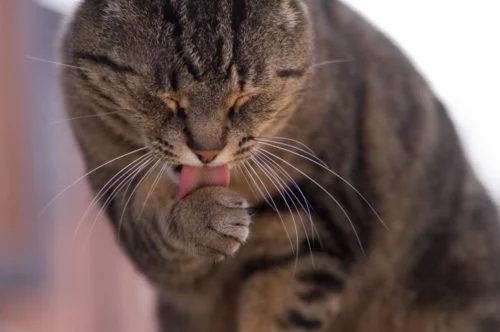
Recovering from Over-grooming:
If your feline friend has been over-grooming and lost a significant amount of fur, it may take some time for their coat to grow back fully. The time it takes for their fur to regrow depends on the severity of over-grooming and the underlying cause. Your cat’s coat may grow back quickly, within a few weeks to a couple of months, or it may take several months or even up to a year. In some rare cases, the fur may not regrow at all depending on the underlying cause.
To ensure a smooth recovery, it is crucial to address any underlying medical or behavioral issues that may have caused the over-grooming. This includes seeking veterinary treatment for skin conditions, managing stress and anxiety, and addressing any dietary issues.
Moreover, it is vital to maintain a healthy and stimulating environment to prevent a relapse of over-grooming. This can be achieved by providing plenty of toys and scratching posts, a balanced and nutritious diet, and regular vet checkups.
In some cases, your vet may recommend medications or supplements to support the regrowth of your cat’s coat, such as omega-3 fatty acid supplements or medications to manage any underlying medical conditions.
It is important to be patient during the recovery process and to provide your cat with plenty of love and attention. With proper treatment and care, most cats are able to fully recover from over-grooming and regrow their fur.
FAQs
Here are some frequently asked questions about your cat licking it’s fur off.
Q. Should I try home remedies to stop my cat from licking its fur off?
A: While some home remedies like adding omega-3 fatty acids to your cat’s diet might help with skin health, it’s crucial to consult with a vet first to determine the cause of the licking.
Q. Is it ever normal for a cat to lick its fur excessively?
A: Occasional grooming is normal for cats, but excessive licking that leads to bald patches or skin irritation is not normal and should be addressed.
Q. Are there any natural remedies I can try to calm my cat?
A: Some cats respond well to natural calming remedies such as pheromone diffusers, calming collars, or herbal supplements. However, it’s important to consult with your vet before trying any new treatments.
